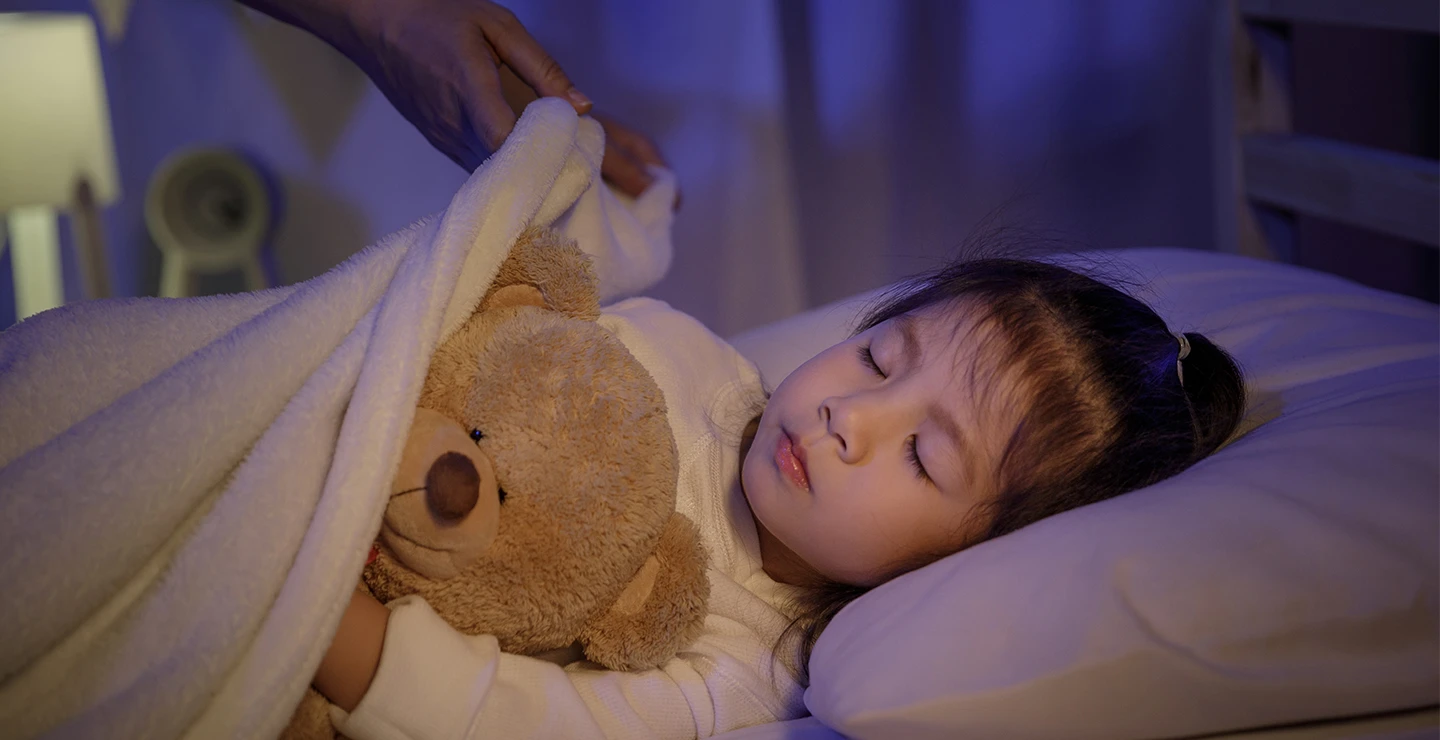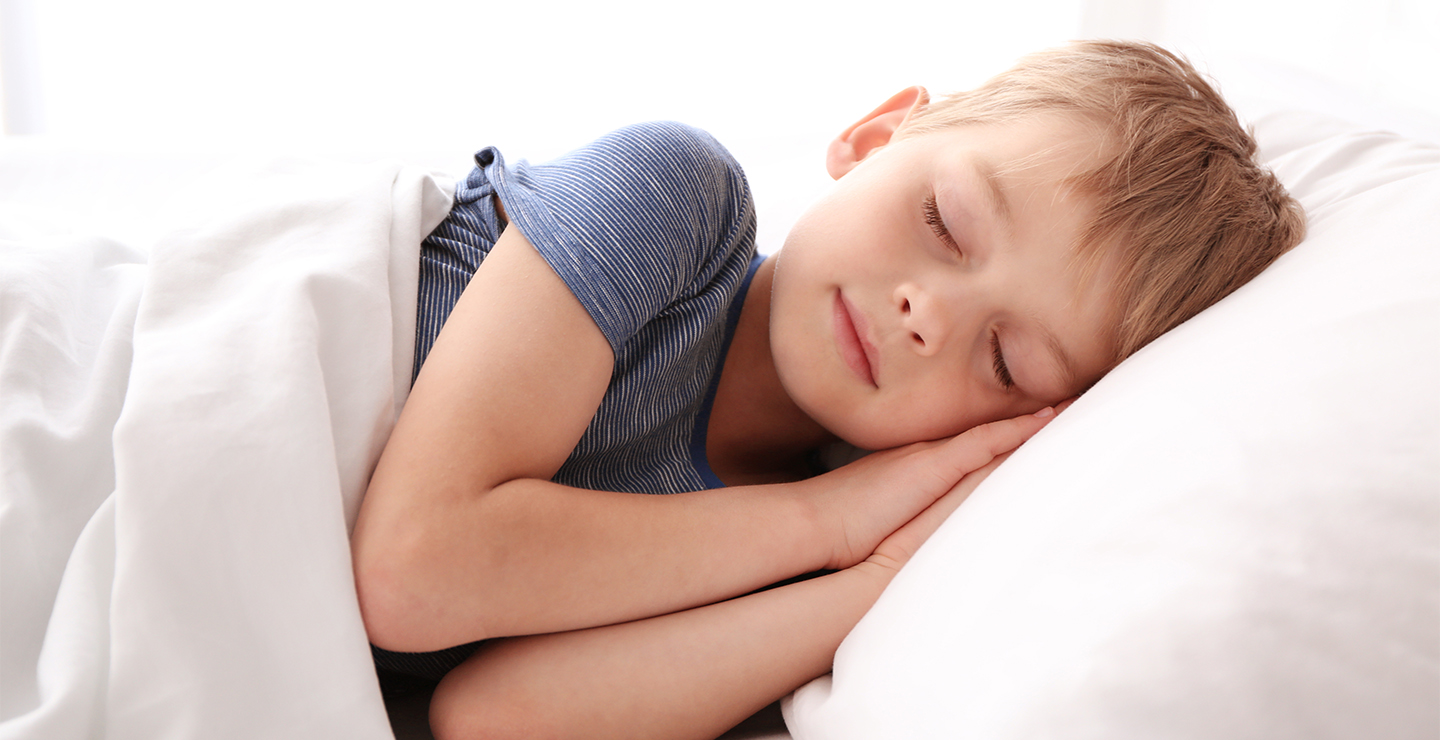How much sleep do kids need?
Parents of kids all ages from infants to toddlers to teens often find themselves wondering if their kid is getting enough sleep.
Struggles & Remedies


Parents of kids all ages from infants to toddlers to teens often find themselves wondering if their kid is getting enough sleep. Research has shown us that getting the right amount of sleep is incredibly important for a child’s developing body and brain.
During sleep, the child’s body is growing, her immune system is ramping up to help fight any germs she’s picked up during the day, and her brain is helping prepare her for a new day of learning. Not getting enough sleep can impact a child’s health, learning ability, and social life.
While every child has different needs, here are the recommended guidelines for how often your child should be sleeping according to the National Sleep Foundation.
During sleep, the child’s body is growing, her immune system is ramping up to help fight any germs she’s picked up during the day, and her brain is helping prepare her for a new day of learning. Not getting enough sleep can impact a child’s health, learning ability, and social life.
While every child has different needs, here are the recommended guidelines for how often your child should be sleeping according to the National Sleep Foundation.
Newborns (0-3 months) 14-17 hours
Typically newborns don’t sleep through the night. They sleep in short spurts, wake up to feed, stay awake for a short while, and sleep again. Each sleep-eat-wake cycle can be anywhere from 1.5 to 3 hours. Following these cycles, newborns should be getting about seven to nine hours of sleep at nighttime and six to eight in the daytime. Newborns fall into REM sleep (the deepest sleep) much more rapidly, which helps their brains develop.
Infants (4-11 months) 12-15 hours
Between four and eleven months, your infant should start being able to sleep in longer spurts. Her daytime naps should decrease while her ability to fall and stay asleep should increase. Many infants will start sleeping through the night around the 4-month mark and transition to a three naps schedule in the day.
This is also the age when some infants tend to get fussy about separation with a parent at bedtime. If your child’s having trouble with separation at bedtime, read tips on how to soothe her back to sleep.
This is also the age when some infants tend to get fussy about separation with a parent at bedtime. If your child’s having trouble with separation at bedtime, read tips on how to soothe her back to sleep.
Toddlers (1-2 years) 11-14 hours
Your toddler still likely needs a daytime nap or two, but he should start being able to consistently sleep through the night. This is also the age where a bedtime routine, like always reading a story before bed, can be immensely helpful in helping your child gain healthy and consistent sleep habits.
Preschoolers (3-5 years) 10-13 hours
At this age, your child will probably go from having one nap a day to having no nap, depending on his particular needs. He should be sleeping all the way through the night. Preschool is also the age where you may start to notice your child sleeping inconsistently. New friends, new activities, and new stimulations can all impact your child’s ability to fall and stay asleep.
School-age children (6-13 years) Nine to 11 hours
School-age children should be on a consistent sleep schedule where they sleep throughout the night with no naps.
This may be the age where children can start developing poor sleep habits, like bringing bright screens to bed or staying up late talking to friends. If you notice your child has extreme difficulty waking or sleeps in very late on weekends, your child may not be getting an adequate amount of sleep.
This may be the age where children can start developing poor sleep habits, like bringing bright screens to bed or staying up late talking to friends. If you notice your child has extreme difficulty waking or sleeps in very late on weekends, your child may not be getting an adequate amount of sleep.
“Unfortunately, teenagers are also the most likely group of children to be sleep deprived.”
Teenagers (14-17 years) Eight to 10 hours
Like younger children, teenagers still need a lot of sleep. Their bodies are developing at a rapid pace, which can be exhausting, and their brain is still growing.
Unfortunately, teenagers are also the most likely group of children to be sleep deprived. Early school hours, homework, sports, and social lives can all cut into sleep, and “catching up” on the weekends doesn’t undo the damage that chronically not getting enough sleep on weekdays causes. So it is important to help your teenager make sleep a priority so that he can consistently get eight to ten hours of sleep at night.
Unfortunately, teenagers are also the most likely group of children to be sleep deprived. Early school hours, homework, sports, and social lives can all cut into sleep, and “catching up” on the weekends doesn’t undo the damage that chronically not getting enough sleep on weekdays causes. So it is important to help your teenager make sleep a priority so that he can consistently get eight to ten hours of sleep at night.
Young adults (18+ years) Seven to nine hours
Eighteen-year-olds need about seven to nine hours of sleep a night, which is the same as all adults (except the elderly, who need less).
However, they’re also likely to have trouble getting those full seven to nine hours because of rapid changes in lifestyle – moving out, college, work, and travel can all impact how much sleep your child gets.
However, they’re also likely to have trouble getting those full seven to nine hours because of rapid changes in lifestyle – moving out, college, work, and travel can all impact how much sleep your child gets.
WHAT YOU CAN DO IF YOUR CHILD ISN’T GETTING ENOUGH SLEEP?
There are many reasons your child may be having trouble sleeping, from school stress to sleeping in late on weekends to not being able to quiet her mind at night. If your child can’t seem to get a good night’s sleep, try these helpful hints and tips:
- Make sure your child has a consistent schedule where he wakes up at the same time each day and goes to bed at the same time each night (even on weekends).
- Teach her great sleep hygiene habits to make her room as sleep-friendly as possible.
- Help him self-soothe and calm his mind with breathing exercises or counting sheep. (Hint: Read a more detailed list of hints and tips to help your child sleep better, as well as sleep exercises.)
- Consult with your pediatrician about a kid-friendly sleep aid, like melatonin.
HERE IS SOME HELPFUL INFORMATION ABOUT MELATONIN FOR KIDS:
Melatonin is a drug-free, non-habit forming supplement for occasional sleeplessness. It contains a sleep hormone that your child’s body creates when her brain’s telling her body it’s time for bed. You can find more information about melatonin for kids by reading this article.
A kid-friendly melatonin sleep aid like drug-free PURE Zzzs Kidz Melatonin Gummies (ages 4+) works naturally with your child’s body to help them fall asleep.*
We hope that the article highlights how important sleep is for kids of all ages and gives you some helpful tips that you can apply to help your child sleep. Remember that every child’s needs are different, but so long as she’s getting about the recommended amount, she’s probably getting enough sleep.
However, if you notice your child is frequently cranky, lethargic, or has trouble focusing, she may not be getting enough sleep, which can impact all areas of her life. She may have trouble falling asleep, or she may be waking up throughout the night. If your child suffers from occasional sleeplessness, explore the recommendations from the sleep experts at ZzzQuil. If your child has ongoing trouble falling or staying asleep, talk to your pediatrician.
A kid-friendly melatonin sleep aid like drug-free PURE Zzzs Kidz Melatonin Gummies (ages 4+) works naturally with your child’s body to help them fall asleep.*
We hope that the article highlights how important sleep is for kids of all ages and gives you some helpful tips that you can apply to help your child sleep. Remember that every child’s needs are different, but so long as she’s getting about the recommended amount, she’s probably getting enough sleep.
However, if you notice your child is frequently cranky, lethargic, or has trouble focusing, she may not be getting enough sleep, which can impact all areas of her life. She may have trouble falling asleep, or she may be waking up throughout the night. If your child suffers from occasional sleeplessness, explore the recommendations from the sleep experts at ZzzQuil. If your child has ongoing trouble falling or staying asleep, talk to your pediatrician.




